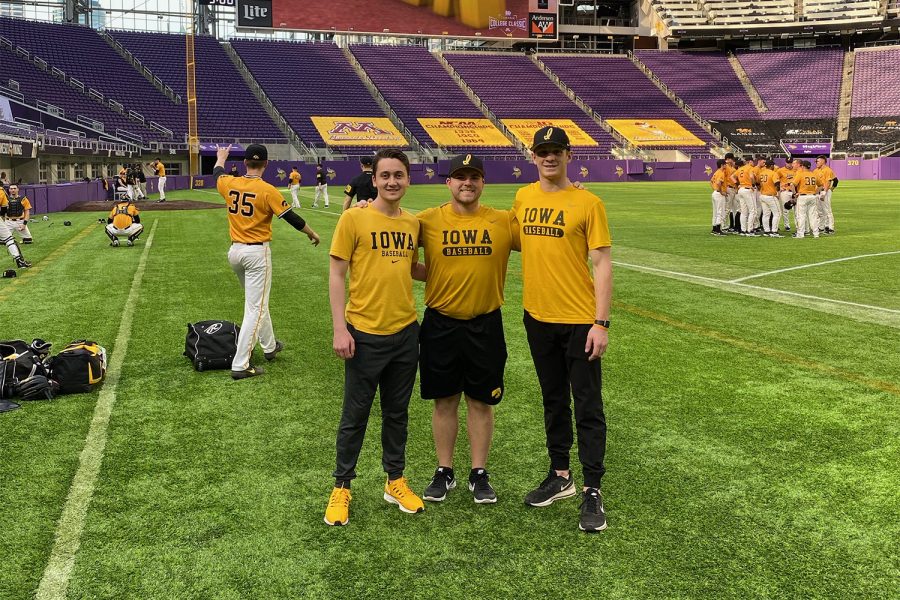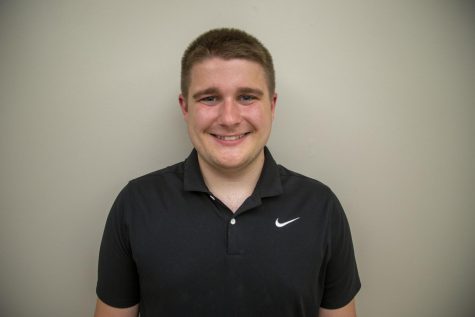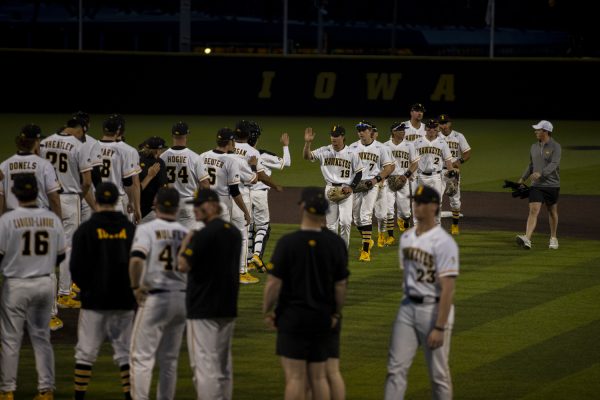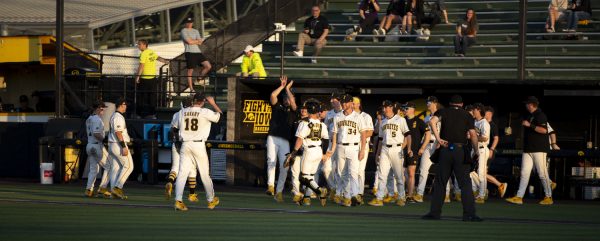Iowa baseball student managers making the best out of uncertain time
Adam Schuck and Sam Bornstein, both UI seniors with the Hawkeye baseball program, are heading into an uncertain job market amid the COVID-19 pandemic.
May 10, 2020
Adam Schuck and Sam Bornstein, both University of Iowa seniors and student managers for the Iowa baseball team, are making the best of a bad situation.
Baseball is shut down at every level in the U.S. amid the COVID-19 pandemic. The people working in baseball — more specifically, the people entering the baseball job market — face uncertainty.
Dating back to their freshman years, Schuck and Bornstein have worked within the Iowa baseball program. As seniors, Schuck has taken over as the head student manager, while Bornstein now directs the analytics, tech, and scout team as the lead data analyst.
“[Shuck and Bornstein] have really grown and matured into young professionals who are going to go out into professional baseball, and I think make an impact for professional teams,” Iowa head baseball coach Rick Heller said. “They’re both incredibly smart, incredibly motivated. They are unselfish team players that have really helped our program grow. Those two have really set the tone on what it means to be a manager in our program.”
Along with the other student managers and baseball operations staff, Schuck and Bornstein are the people behind the scenes that enable the program’s success.
Schuck and the other on-field managers arrive at the field hours before first pitch during the season to set up batting practice, finalize scouting reports, and complete other game-day tasks. On the days Iowa doesn’t have a game, the managers set up practice and help prepare for upcoming opponents.
Bornstein and the other data analysts are responsible for all of Iowa’s player development data, which is geared toward reports for the coaching staff or any other projects that may be going on within the program.
Fifteen games into the 2020 regular season, Iowa stood at 10-5 with victories over No. 18 Arizona, No. 20 North Carolina, and No. 14 Duke.
By March 12, the team had just swept Kansas in a two-game series at Duane Banks Field and was set to travel to California for a weekend series against Cal-State Northridge. Roughly an hour before the team was set to begin its travel, Schuck said Heller called a team meeting to announce the trip had been canceled and that the team would be scrimmaging over the next couple days.
An hour later, Heller called another team meeting. This time, he told them the season was over because of the novel coronavirus.

Fans watch the action during a baseball game between Iowa and UC Irvine at Duane Banks Field on Sunday, May 5, 2019. The Hawkeyes lost to the Anteaters, 15-4.
“I was devastated,” Bornstein said. “I actually wasn’t at the team meeting. Someone FaceTimed me into the meeting so I could hear what was going on. It was awful news, but obviously it was the right decision.”
The Big Ten canceled all sports for the remainder of the academic year on March 12, including spring sports that played past that time. The next day, the conference put a hold on all organized team activities and Major League Baseball suspended spring training.
Beyond their responsibilities with the Iowa program, Schuck and Bornstein were set to hit the job market in professional baseball following this season.
Schuck is most interested in pitching and his ideal landing spot would be as a college or professional pitching coach. He has previously worked with the St. Louis Cardinals’ Class A affiliate, the Peoria Chiefs of the Midwest League. Last summer, he was a quality control coach with the short season affiliate of the Seattle Mariners.
“I sent a lot of emails,” Schuck said. “I made this project on one of our pitchers where I analyzed one of his pitches and what he could do to make it better. It got into the hands of the right people… It just kind of took off from there.”
Schuck said going into this season, a majority of the student manager staff had jobs or internships set up over the summer, all of which have now been canceled or pushed back.
Bornstein was set to work within the Chicago White Sox organization following the season.
“I was going to work with one of the White Sox affiliates in Great Falls, Montana, as well as their spring training complex in Phoenix, Arizona, but given the circumstances that won’t be happening this year,” Bornstein said. “It potentially could happen in future years — so I’m kind of in limbo right now.”
The season may have stopped for Schuck and Bornstein, but the work hasn’t.
In the months following the premature end to Iowa’s year, Schuck said he’s been working on some personal development that he had been neglecting during the season — including learning more about coding and how the human body works.
Bornstein has been focused on polishing HawkDashboard, an app he created for the team last summer and has been adding to ever since. The app encompasses player profiles, post-action reports, statistics, and several other features that have allowed the program to dive into analytics even more.
HawkDashboard turned what was hours of data entry work after a weekend series into a process that only takes roughly 10 seconds. The app is only one example of what Bronstein said he could bring to a professional team.
“I want to end up in a front office working in an analytics department,” Bornstein said. “I’ve had a couple glimpses the past two years of interviews for that. I think I’m close, but hopefully in this down time I can really sharpen up my skills and get closer to that dream of mine.”
Bornstein knew when he was a senior in high school that he wanted to work in professional baseball after college. For Schuck, it was as a sophomore at Iowa that he figured out there was a future for himself in baseball.
Those pursuits are on hold for now. However, for Schuck and Bornstein, this time may lead to even greater success once baseball is back.
“If you don’t come out of this situation with a new skill set of some sort, you’re probably just wasting your time and not being honest with yourself,” Schuck said. “This is a great opportunity for everybody that’s actually willing to take it.”















